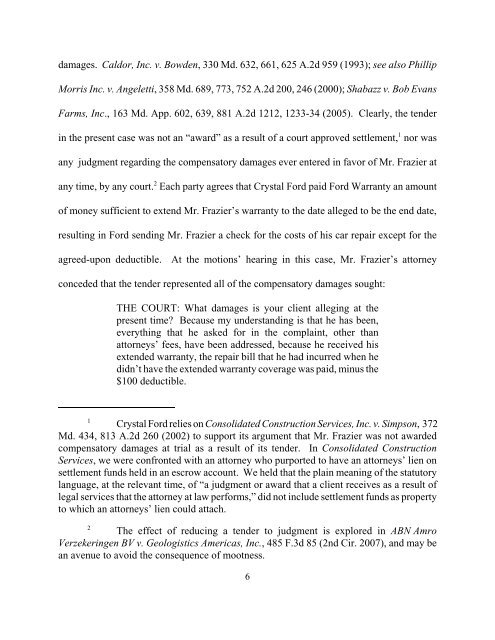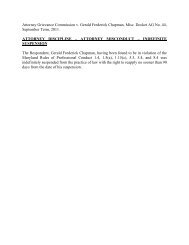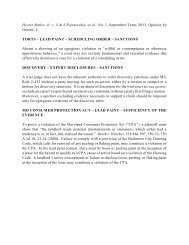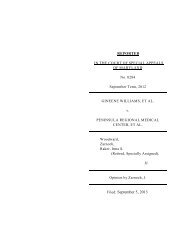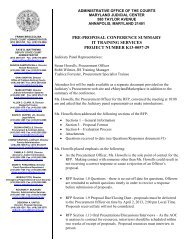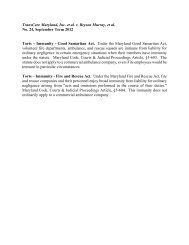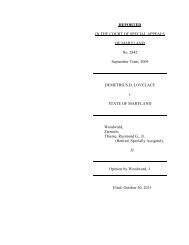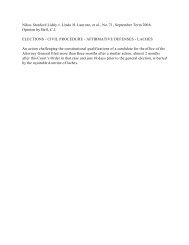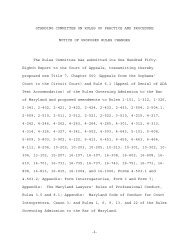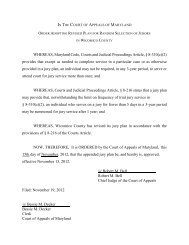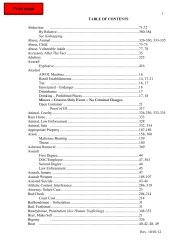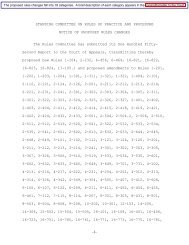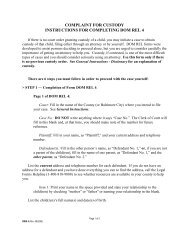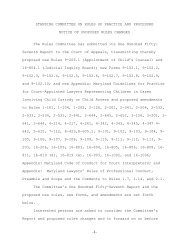Anthony M. Frazier v. Castle Ford, Ltd., f/k/a ... - Maryland Courts
Anthony M. Frazier v. Castle Ford, Ltd., f/k/a ... - Maryland Courts
Anthony M. Frazier v. Castle Ford, Ltd., f/k/a ... - Maryland Courts
You also want an ePaper? Increase the reach of your titles
YUMPU automatically turns print PDFs into web optimized ePapers that Google loves.
damages. Caldor, Inc. v. Bowden, 330 Md. 632, 661, 625 A.2d 959 (1993); see also Phillip<br />
Morris Inc. v. Angeletti, 358 Md. 689, 773, 752 A.2d 200, 246 (2000); Shabazz v. Bob Evans<br />
Farms, Inc., 163 Md. App. 602, 639, 881 A.2d 1212, 1233-34 (2005). Clearly, the tender<br />
in the present case was not an “award” as a result of a court approved settlement, 1 nor was<br />
any judgment regarding the compensatory damages ever entered in favor of Mr. <strong>Frazier</strong> at<br />
any time, by any court. 2 Each party agrees that Crystal <strong>Ford</strong> paid <strong>Ford</strong> Warranty an amount<br />
of money sufficient to extend Mr. <strong>Frazier</strong>’s warranty to the date alleged to be the end date,<br />
resulting in <strong>Ford</strong> sending Mr. <strong>Frazier</strong> a check for the costs of his car repair except for the<br />
agreed-upon deductible. At the motions’ hearing in this case, Mr. <strong>Frazier</strong>’s attorney<br />
conceded that the tender represented all of the compensatory damages sought:<br />
THE COURT: What damages is your client alleging at the<br />
present time? Because my understanding is that he has been,<br />
everything that he asked for in the complaint, other than<br />
attorneys’ fees, have been addressed, because he received his<br />
extended warranty, the repair bill that he had incurred when he<br />
didn’t have the extended warranty coverage was paid, minus the<br />
$100 deductible.<br />
1<br />
Crystal <strong>Ford</strong> relies on Consolidated Construction Services, Inc. v. Simpson, 372<br />
Md. 434, 813 A.2d 260 (2002) to support its argument that Mr. <strong>Frazier</strong> was not awarded<br />
compensatory damages at trial as a result of its tender. In Consolidated Construction<br />
Services, we were confronted with an attorney who purported to have an attorneys’ lien on<br />
settlement funds held in an escrow account. We held that the plain meaning of the statutory<br />
language, at the relevant time, of “a judgment or award that a client receives as a result of<br />
legal services that the attorney at law performs,” did not include settlement funds as property<br />
to which an attorneys’ lien could attach.<br />
2<br />
The effect of reducing a tender to judgment is explored in ABN Amro<br />
Verzekeringen BV v. Geologistics Americas, Inc., 485 F.3d 85 (2nd Cir. 2007), and may be<br />
an avenue to avoid the consequence of mootness.<br />
6


